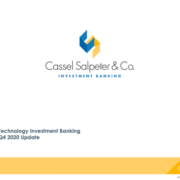Archive for year: 2021
Nine Must Reads for the CRE Industry Today (July 29, 2021)
By WMRE Staff
July 28, 2020
The CDC’s revised guidance on masking has shaken up return-to-office plans for companies. Some are shifting timelines and policies. Other companies are moving towards requiring employees to be vaccinated before they can return. These are among today’s must reads from around the commercial real estate industry.
- Google delays workers’ return to office, will require COVID vaccinations for employees “In a Wednesday email sent to Google’s more than 130,000 employees, CEO Sundar Pichai said the company is now aiming to have most of its workforce back to its offices beginning Oct. 18 instead of its previous target date of Sept. 1. The decision also affects tens of thousands of contractors who Google intends to continue to pay while access to its campuses remains limited.” (KTLA)
- Work-from-home threat “overstated,” Boston Properties CEO says “While the continued work-from-home trend will have a long-term impact on the office market, the threat is ‘overstated’ for landlords of Class A office space, Boston Properties CEO Owen Thomas said Wednesday.” (The Real Deal)
- New C.D.C. mask guidance complicates back-to-office plans. “Companies that have already opened their doors must decide whether to retrench on masking policies. When the C.D.C. lifted its masking guidance in May, many companies issued new guidelines allowing fully vaccinated employees and customers to return without masks. The move served as an important incentive for workers, as well as a signal that the pandemic was winding down. For employees, it provided a sense of safety and normality in returning to offices.” (The New York Times)
- It really is different this time “When we examine the most-recent recession versus previous recessions, its status as an outlier becomes even more stark and apparent. If we measure duration in months versus severity (as measured by peak unemployment rate) a clear relationship emerges: deeper recessions are also longer recessions, while shallower recessions are shorter recessions. But the 2020 recession breaks that relationship with a deep, short recession, the likes of which we have never observed in the U.S.” (JLL)
- Beyond Zoom: Can Virtual Reality And Hologram Tech Reinvigorate Remote Work? “These different spins on the sci-fi premise of speaking to holograms at the office share a few things in common, namely a desire by Big Tech to make videoconferencing better and iron out the kinks in personal communication in newly remote and hybrid offices. Gartner research predicts by 2023, more than 40% of workers will work remotely at least one day a week, up from less than 30% before the coronavirus pandemic.” (Bisnow)
- Private Equity Makes Play for Skilled Nursing “The tragic human effects outweighed others, but there were also economic and business impacts from the pandemic that are currently still affecting the skilled nursing segment. REITs looking for stable income got nervous, according to investment banker James Cassel, chairman & cofounder, Cassel Salpeter & Co.” (GlobeSt.com)
- Social Clubs Could Be Way To Lure Office Workers Back “As workers trickle back to offices across the U.S., many employers may be seeking ways to encourage in-person interaction among employees who’ve worked remotely for 16 months. They would be interested to know about the forecast recently put forth by architecture, design and strategy firm NELSON Worldwide. Its prediction: The future office will evolve to become more like a social club than workplace.” (Forbes)
- ‘A Wild 15 Months’: Pandemic Spurs Conversion of Offices to Labs “Across the six largest U.S. life sciences markets, more than 20 percent of the laboratory spaces being built are conversions from offices. In San Francisco, Chicago, Boston and Raleigh, N.C., asking rents for lab space have increased more than 60 percent since the beginning of 2016, while office rents have crept up only 15 to 30 percent.” (The New York Times)
- Hot Housing Market Lets Banks Sell Mortgage Risk “The transfers are a product of the effort to shield Fannie Mae and Freddie Mac from the risk of a mortgage-market reversal. Banks are now using them to raise capital and otherwise shore up their balance sheets, a process that ultimately adds to their lending capacity, analysts said.” (The Wall Street
Journal)
Click here to read the full article.
Private Equity Makes Play for Skilled Nursing
Covid deaths have had a big impact on investments in the sector.
By Erik Sherman
July 27th, 2021
The pandemic had a brutal effect in nursing homes. Mortality levels jumped from 17% in 2019 to 22.5% in 2020—nearly a one-third increase—according to a report from the Office of the Inspector General for the Department of Health and Human Services. “This 32% increase amounts to 169,291 more deaths in 2020 than if the mortality rate had remained the same as in 2019,” the report said.
The data was based solely on Medicare claims, as nursing homes weren’t required to report Covid-19 cases and deaths before May 8, 2020, and so the number of deaths in nursing homes was likely higher.
The tragic human effects outweighed others, but there were also economic and business impacts from the pandemic that are currently still affecting the skilled nursing segment. REITs looking for stable income got nervous, according to investment banker James Cassel, chairman & cofounder, Cassel Salpeter & Co.
Click here to read the full article.
Click here to read the full pdf.
SoftBank Unit to Invest in Thiel-Backed Crypto Exchange Bullish
A unit of SoftBank Group Corp. agreed to invest $75 million in Bullish, the sponsor of a not-yet-operational cryptocurrency exchange, as the startup prepares to go public through a merger with a special purpose acquisition company.
SB Northstar LP will acquire 7.5 million Bullish shares for $10 each at the time it combines with Far Peak Acquisition Corp., according to documents filed July 9 with the U.S. Securities and Exchange Commission. It will also buy 3 million warrants to purchase shares of Far Peak, the SPAC taking Bullish public in a move that could value the combined entity at about $9 billion.
The SoftBank unit made the commitment through a $300 million private offering that Bullish held last week, according to the filings, though it was not identified in a subsequent release as one of the buyers. Representatives for SoftBank, Bullish and Far Peak all declined to comment.
By participating in the deal, SB Northstar joins a who’s who of executives involved with Bullish. The crypto company was launched in May by Block.One, a blockchain software company backed by Peter Thiel and hedge fund managers Alan Howard and Louis Bacon. Other investors include Hong Kong tycoon Richard Li and German entrepreneur Christian Angermayer. Meanwhile, upon completion of the SPAC transaction, Far Peak Chief Executive Officer Thomas Farley, a former president of the New York Stock Exchange, will become Bullish’s CEO.
SB Northstar, the asset management arm of Masayoshi Son’s SoftBank, became known as the “Nasdaq whale” after it made multi-billion dollar wagers on publicly traded tech stocks. SoftBank’s bets in crypto have been much smaller so far: It also disclosed this month that its Latin American Fund invested $200 million in Mercado Bitcoin, a Brazilian digital assets platform.
Still, it’s a sign that Son, who reportedly lost $130 million on Bitcoin when he sold in 2018, may be starting to warm to the crypto sector. In May, he said Bitcoin’s popularity has made it into a platform that “can’t be ignored,” though he doesn’t know its true value or if it’s a bubble.
SB Northstar will acquire the Far Peak warrants from either the sponsors of the SPAC or its anchor investors, which include funds managed by BlackRock Inc., according to the filing.
The seller will take a $1.5 million loss by selling the warrants below cost. That’s a step that SPACs may take to attract high-profile investors, said James Cassel, chairman of Cassel Salpeter & Co., a Miami-based investment bank that advises on SPACs.
“SoftBank has said ‘you can use my name and it will validate the deal and make all of the stock worth a lot more,’” Cassel said in a telephone interview.
More stories like this are available on bloomberg.com
Subscribe now to stay ahead with the most trusted business news source. ©2021 Bloomberg L.P.
Click here to read the original pdf.
SoftBank Unit to Invest in Thiel-Backed Crypto Exchange Bullish
- Bullish to sell 7.5 milliom shares to SoftBank’s SB Northstar
- It’s the second crypto wager disclosed by SoftBank this month
A unit of SoftBank Group Corp. agreed to invest $75 million in Bullish, the sponsor of a not-yet-operational cryptocurrency exchange, as the startup prepares to go public through a merger with a special purpose acquisition company.
SB Northstar LP will acquire 7.5 million Bullish shares for $10 each at the time it combines with Far Peak Acquisition Corp., according to documents filed July 9 with the U.S. Securities and Exchange Commission. It will also buy 3 million warrants to purchase shares of Far Peak, the SPAC taking Bullish public in a move that could value the combined entity at about $9 billion.
The SoftBank unit made the commitment through a $300 million private offering that Bullish held last week, according to the filings, though it was not identified in a subsequent release as one of the buyers. Representatives for SoftBank, Bullish and Far Peak all declined to comment.
By participating in the deal, SB Northstar joins a who’s who of executives involved with Bullish. The crypto company was launched in May by Block.One, a blockchain software company backed by Peter Thiel and hedge fund managers Alan Howard and Louis Bacon. Other investors include Hong Kong tycoon Richard Li and German entrepreneur Christian Angermayer.
Meanwhile, upon completion of the SPAC transaction, Far Peak Chief Executive Officer Thomas Farley, a former president of the New York Stock Exchange, will become Bullish’s CEO.
Read more: Thiel-Backed Crypto FirmBullish in $9 Billion SPAC Merger
SB Northstar, the asset management arm of Masayoshi Son’s SoftBank, became known as the “Nasdaq whale” after it made multi-billion dollar wagers on publicly traded tech stocks. SoftBank’s bets in crypto have been much smaller so far: It also disclosed this month that its Latin American Fund invested $200 million in Mercado Bitcoin, a Brazilian digital assets platform.
Still, it’s a sign that Son, who reportedly lost $130 million on Bitcoin when he sold in 2018, maybe starting to warm to the crypto sector. In May, he said Bitcoin’s popularity has made it into a platform that “can’t be ignored,” though he doesn’t know its true value or if it’s a bubble.
Read more: Masayoshi Son’s Not Racing to Join Tesla in Buying Bitcoin
SB Northstar will acquire the Far Peak warrants from either the sponsors of the SPAC or its anchor investors, which include funds managed by BlackRock Inc., according to the filing.
The seller will take a $1.5 million loss by selling the warrants below cost. That’s a step that SPACs may take to attract high-profile investors, said James Cassel, chairman of Cassel Salpeter & Co., a Miami-based investment bank that advises on SPACs.
“SoftBank has said ‘you can use my name and it will validate the deal and make all of the stock worth a lot more,’” Cassel said in a telephone interview.
— With assistance by Pavel Alpeyev
Click here to read the PDF.

Get In Touch
Cassel Salpeter & Co.
801 Brickell Avenue,
Suite 1900
Miami, FL 33131
(305) 438-7700
Stay Informed
Sign up today for insights and growth strategies.
Subscribe Now






